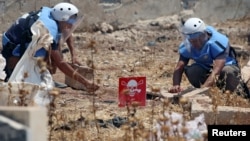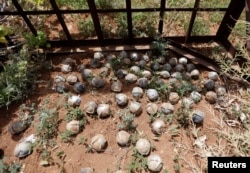A report released ahead of next week’s U.N. conference on the Convention on Cluster Munitions has condemned the continued use of cluster munitions by Syria and Yemen. They are the only two countries that still use the bombs, which are banned under international law.
The report, known as the Cluster Munition Monitor, has recorded more than 230 cluster munition strikes in opposition-held areas across Syria over the past year. It says the number of attacks has increased since Russia began joint military operations with Syrian forces on September 30, 2015.
Mary Wareham is advocacy director with Human Rights Watch's Arms Division. Wareham said most of the munitions used in Syria were manufactured in what was then the Soviet Union decades ago and that most of the cluster bomb attacks in Syria have been carried out by government forces.
She said Russian Foreign Minister Sergei Lavrov neither denies nor confirms Russian use of the weapons in Syria, although, she added, Lavrov does deny they have been used indiscriminately.
“We disagree. When cluster munitions are dropped from the air or launched from the ground, they fall over a wide area and civilians caught up in that are harmed. That is indiscriminate use. There is no way that cluster munitions can be used discriminately. So, Russia, we believe, is on the losing side of that argument and it is holding on to a weapon that the rest of the world has firmly rejected,” said Wareham.
More than 100 countries have joined the treaty known as the Cluster Munitions Convention since it took effect in August 2010. The treaty prohibits the use, production, and trade in such weapons and calls for the destruction of stockpiles within eight years of becoming party to the treaty.
The report says cluster munition casualties doubled last year, with civilians accounting for nearly all of the victims. The monitor’s casualty and victim assistance editor, Loren Persi, said at least 971 new casualties were recorded in 10 countries last year.
“So, this was the second-highest number of casualties that we have ever recorded since cluster munition monitoring reporting started in 2009 and it was very similar to the last peak in casualties recorded in 2013, which was also around 1,000 casualties. The vast majority of those casualties occurred in Syria," he said.
Persi said cluster bombs killed and maimed 837 civilians in Syria and another 20 in Yemen.
The report adds the Saudi-led coalition is responsible for cluster munition attacks against Houthi rebels in Yemen. The report says the weapons used were manufactured in Brazil, the United States and Britain.
The report also says cluster munitions reportedly were used in Libya and Iraq back in February, allegedly by Islamic State militants but that it cannot verify either of those reports.





